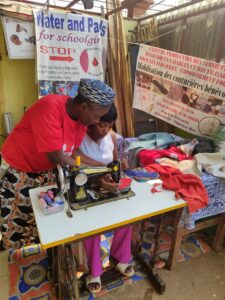Presented at the International Meeting in Geneva
Women are the engines of an economy, but their contribution is completely ignored. Only the efforts of women who are part of paid employment is counted for their economic participation, but what about the hardworking women who care for family members without getting paid.
The invisibility of women workers is appalling because their work is essential to the survival of society and provides a huge and unnoticed subsidy to the “formal” economy. It is also inefficient and unjust, adding significantly to the relational inequalities that are so entrenched in our society. It disempowers even paid women workers as what women do is undervalued or rather not even put in the category of work; hence household chores form part of the responsibility of even paid women workers putting a double burden on them thereby reducing their efficiency. This contributes to large gender gaps in wages. And it allows policymakers to forget about the conditions of hundreds of millions of workers on whom the entire economy depends.
It is a lack of monetary income which is a source of weakness and vulnerability in women. Lack of financial independence also leads to continued violence against women making them commit suicide.
India accounts for 37 per cent of women’s suicides globally. The Lancet Public Health Journal has reported that single, divorced and widowed women are less likely to commit suicide because marriage offers no protection against it. According to Lancet, arranged and early marriages and motherhood, low social status, and lack of economic independence also lead young women (between ages of 15 to 39) to commit suicide.
Even in the largest companies, less than one tenth of the employees are women. Being forced to be homemakers with rising household incomes, they are cut off from the outside world and get depressed, especially with abusive husbands and unable to stand up to continuous mental torture — women commit suicide.
The lack of childcare is a major constraint on women’s economic participation, given the division of labour within households. Adequate, affordable and reliable childcare is an issue for women working in all sectors. Care services for disabled, ill and elderly is also important to women’s participation. Requiring employers to bear the costs of childcare could be seen as introducing new barriers to equal opportunities, as it can result in women being seen to be more expensive workers than men.
Although many countries have undertaken efforts towards childcare activities, the conclusion of the 2005 review done by the UN Millennium Project was that “not one country provides the investment in care services that is required to fully meet the needs of women and their children.
So, what happens is not a decline in women’s work participation, but a shift from recognised work to unpaid work. This is a dispiriting shift because it is also typically associated with women’s and girls’ loss of agency and bargaining power within the family. It is also typically not voluntary: most of the women surveyed responded that they did such work because there was no one else in the household available to do it.
Measures to enhance women’s participation in labour market
Support for labour market re-entry – Women taking a break from employment due to family compulsions should be facilitated to have access back to it at the same level and with the same remuneration had she not to take a break. And the employers plea that the employees absence from work results in reduced efficiency, in any way, then there can be skill up gradation by the employer by making women employees undergo short training programmes so that they catch up with the workforce, This will also provide savings to companies on recruitment.;hence more efficient use of talent in the workforce.
Developing skill acquisition and training – both pre-employment and while employed, to increase women’s access to more rewarding areas of employment. This requires measures related to training and retraining, but also complementary approaches to enable women to find and keep jobs in which they can use the skills gained.
Assistance with family responsibilities by encouraging and complementing employer measures to enable workers to handle family responsibilities, such as childcare and paternity leave to encourage men.
Entrepreneurship training for women – Digital technology can be a great enabler for increasing women’s capability and capacity. The digital technology offers great opportunity to leverage time resources and women can be trained in digital capability to make its use in their own comfortable space by leveraging available time; hence coping with the competing demands of work and family responsibilities.
Promoting women entrepreneurs- Women entrepreneurs find it difficult to raise funds. They should be encouraged and given easier access to loans. Skill training has to be given to rural women to increase their capacity to earn incomes. Otherwise, a lot of talent will be lost which could contribute to the economic growth of the country and enhance the welfare of the people.
National governments role is important as they can take action in a wide range of areas.
- a) They can bring employment legislation into conformity with international norms on non- discrimination, equal pay, workers with family responsibilities, and maternity leave.
- b) Support innovative approaches to making childcare available and affordable for working parents;
- c) Advocate family-friendly practices by employers.
- d) Information campaigns, and guidance on good practices with respect to leave, hours, flexibility, and advocate the use of provisions for family responsibility by men as well as
- e) Incorporate gender perspectives to the development or review of social security and pensions programs; and improve the quality, dissemination and use of data on women’s economic participation and
- f) Facilitate policies that address the constraints faced by women due to child and family care responsibilities that are a major constraint for women.
- g) Increased education and training for women in non-traditional subjects.
To conclude I would like to add that in the era of globalization, the role of women at home and work has taken a multifaceted dimension. The economies should recognise the contribution made by women with full appreciation.
A very encouraging step taken by NSSO (National Sample Survey Office) in India is that household chores will be considered as part of economy boosting work.




